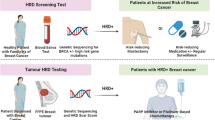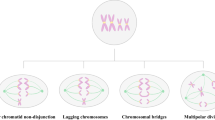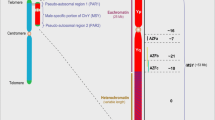Abstract
Currently, routine genetic investigation for male infertility includes karyotyping analysis and PCR for Y chromosomal microdeletions to provide prognostic information such as sperm retrieval success rate. However, over 85% of male infertility remain idiopathic. We assessed 101 male patients with primary infertility in a retrospective cohort analysis who have previously received negative results from standard-of-care tests. Mate-pair genome sequencing (large-insert size library), an alternative long-DNA sequencing method, was performed to detect clinically significant structural variants (SVs) and copy-number neutral absence of heterozygosity (AOH). Candidate SVs were filtered against our in-house cohort of 1077 fertile men. Genes disrupted by potentially clinically significant variants were correlated with single-cell gene expression profiles of human fetal and postnatal testicular developmental lineages and adult germ cells. Follow-up studies were conducted for each patient with clinically relevant finding(s). Molecular diagnoses were made in 11.1% (7/63) of patients with non-obstructive azoospermia and 13.2% (5/38) of patients with severe oligozoospermia. Among them, 12 clinically significant SVs were identified in 12 cases, including five known syndromes, one inversion, and six SVs with direct disruption of genes by intragenic rearrangements or complex insertions. Importantly, a genetic defect related to intracytoplasmic sperm injection (ICSI) failure was identified in a patient with non-obstructive azoospermia, illustrating the additional value of an etiologic diagnosis in addition to determining sperm retrieval rate. Our study reveals a landscape of various genomic variants in 101 males with idiopathic infertility, not only advancing understanding of the underlying mechanisms of male infertility, but also impacting clinical management.




Similar content being viewed by others
Data sharing statement
The sequencing datasets generated during the current study are not publicly available because most patients did not consent to such sharing but are available from the corresponding author on reasonable request. All relative programs are publicly available: copy-number variant analysis at https://sourceforge.net/projects/increment-ratio-of-coverage-v2/files, structural variant analysis at https://sourceforge.net/projects/bca-analysis/files/ and absence of heterozygosity analysis at https://sourceforge.net/projects/lpgsaoh/files/.
Abbreviations
- CNV:
-
Copy-number variant
- SV:
-
Structural variant
- AOH:
-
Absence of heterozygosity
- IVF:
-
In vitro fertilization
- ICSI:
-
Intracytoplasmic sperm injection
- NOA:
-
Non-obstructive azoospermia
- GS:
-
Genome sequencing
References
Abdullah LC, Zhao M, Wang X, Li X, Xing J (2021) Hypogonadotropic hypogonadism associated with another small supernumerary marker chromosome (sSMC) derived from chromosome 22, a case report. Transl Androl Urol 10:1797–1802. https://doi.org/10.21037/tau-20-1087
Agarwal A, Baskaran S, Parekh N, Cho CL, Henkel R, Vij S, Arafa M, Panner Selvam MK, Shah R (2021) Male infertility. Lancet 397:319–333. https://doi.org/10.1016/s0140-6736(20)32667-2
Alhathal N, Maddirevula S, Coskun S, Alali H, Assoum M, Morris T, Deek HA, Hamed SA, Alsuhaibani S, Mirdawi A, Ewida N, Al-Qahtani M, Ibrahim N, Abdulwahab F, Altaweel W, Dasouki MJ, Assiri A, Qabbaj W, Alkuraya FS (2020) A genomics approach to male infertility. Genet Med 22:1967–1975. https://doi.org/10.1038/s41436-020-0916-0
Barbaro M, Cook J, Lagerstedt-Robinson K, Wedell A (2012) Multigeneration inheritance through fertile XX carriers of an NR0B1 (DAX1) locus duplication in a kindred of females with isolated XY gonadal dysgenesis. Int J Endocrinol 2012:504904. https://doi.org/10.1155/2012/504904
Cao Y, Du J, Chen D, Wang Q, Zhang N, Liu X, Liu X, Weng J, Liang Y, Ma W (2016) RNA-binding protein Stau2 is important for spindle integrity and meiosis progression in mouse oocytes. Cell Cycle 15:2608–2618. https://doi.org/10.1080/15384101.2016.1208869
Cao Y, Chau MHK, Zheng Y, Zhao Y, Kwan AHW, Hui SYA, Lam YH, Tan TYT, Tse WT, Wong L, Leung TY, Dong Z, Choy KW (2022) Exploring the diagnostic utility of genome sequencing for fetal congenital heart defects. Prenat Diagn 42:862–872. https://doi.org/10.1002/pd.6151
Chau MHK, Li Y, Dai P, Shi M, Zhu X, Wah Chung JP, Kwok YK, Choy KW, Kong X, Dong Z (2022) Investigation of the genetic etiology in male infertility with apparently balanced chromosomal structural rearrangements by genome sequencing. Asian J Androl 24:248–254. https://doi.org/10.4103/aja2021106
Cockburn DM, Charish J, Tassew NG, Eubanks J, Bremner R, Macchi P, Monnier PP (2012) The double-stranded RNA-binding protein Staufen 2 regulates eye size. Mol Cell Neurosci 51:101–111. https://doi.org/10.1016/j.mcn.2012.08.008
De Sanctis V, Soliman A, Mohamed Y (2013) Reproductive health in young male adults with chronic diseases in childhood. Pediatr Endocrinol Rev 10:284–296
Del Gaudio D, Shinawi M, Astbury C, Tayeh MK, Deak KL, Raca G, Committee ALQA (2020) Diagnostic testing for uniparental disomy: a points to consider statement from the American College of Medical Genetics and Genomics (ACMG). Genet Med 22:1133–1141. https://doi.org/10.1038/s41436-020-0782-9
Dong Z, Wang H, Chen H, Jiang H, Yuan J, Yang Z, Wang WJ, Xu F, Guo X, Cao Y, Zhu Z, Geng C, Cheung WC, Kwok YK, Yang H, Leung TY, Morton CC, Cheung SW, Choy KW (2018) Identification of balanced chromosomal rearrangements previously unknown among participants in the 1000 Genomes Project: implications for interpretation of structural variation in genomes and the future of clinical cytogenetics. Genet Med 20:697–707. https://doi.org/10.1038/gim.2017.170
Dong Z, Yan J, Xu F, Yuan J, Jiang H, Wang H, Chen H, Zhang L, Ye L, Xu J, Shi Y, Yang Z, Cao Y, Chen L, Li Q, Zhao X, Li J, Chen A, Zhang W, Wong HG, Qin Y, Zhao H, Chen Y, Li P, Ma T, Wang WJ, Kwok YK, Jiang Y, Pursley AN, Chung JPW, Hong Y, Kristiansen K, Yang H, Pina-Aguilar RE, Leung TY, Cheung SW, Morton CC, Choy KW, Chen ZJ (2019a) Genome Sequencing Explores Complexity of Chromosomal Abnormalities in Recurrent Miscarriage. Am J Hum Genet 105:1102–1111. https://doi.org/10.1016/j.ajhg.2019.10.003
Dong Z, Zhao X, Li Q, Yang Z, Xi Y, Alexeev A, Shen H, Wang O, Ruan J, Ren H, Wei H, Qi X, Li J, Zhu X, Zhang Y, Dai P, Kong X, Kirkconnell K, Alferov O, Giles S, Yamtich J, Kermani BG, Dong C, Liu P, Mi Z, Zhang W, Xu X, Drmanac R, Choy KW, Jiang Y (2019b) Development of coupling controlled polymerizations by adapter-ligation in mate-pair sequencing for detection of various genomic variants in one single assay. DNA Res 26:313–325. https://doi.org/10.1093/dnares/dsz011
Dong Z, Chau MHK, Zhang Y, Dai P, Zhu X, Leung TY, Kong X, Kwok YK, Stankiewicz P, Cheung SW, Choy KW (2021a) Deciphering the complexity of simple chromosomal insertions by genome sequencing. Hum Genet 140:361–380. https://doi.org/10.1007/s00439-020-02210-x
Dong Z, Chau MHK, Zhang Y, Yang Z, Shi M, Wah YM, Kwok YK, Leung TY, Morton CC, Choy KW (2021b) Low-pass genome sequencing-based detection of absence of heterozygosity: validation in clinical cytogenetics. Genet Med 23:1225–1233. https://doi.org/10.1038/s41436-021-01128-7
Guo J, Sosa E, Chitiashvili T, Nie X, Rojas EJ, Oliver E, DonorConnect PK, Hotaling JM, Stukenborg JB, Clark AT, Cairns BR (2021) Single-cell analysis of the developing human testis reveals somatic niche cell specification and fetal germline stem cell establishment. Cell Stem Cell 28(764–778):e4. https://doi.org/10.1016/j.stem.2020.12.004
Hafemeister C, Satija R (2019) Normalization and variance stabilization of single-cell RNA-seq data using regularized negative binomial regression. Genome Biol 20:296. https://doi.org/10.1186/s13059-019-1874-1
Han X, Zhou Z, Fei L, Sun H, Wang R, Chen Y, Chen H, Wang J, Tang H, Ge W, Zhou Y, Ye F, Jiang M, Wu J, Xiao Y, Jia X, Zhang T, Ma X, Zhang Q, Bai X, Lai S, Yu C, Zhu L, Lin R, Gao Y, Wang M, Wu Y, Zhang J, Zhan R, Zhu S, Hu H, Wang C, Chen M, Huang H, Liang T, Chen J, Wang W, Zhang D, Guo G (2020) Construction of a human cell landscape at single-cell level. Nature 581:303–309. https://doi.org/10.1038/s41586-020-2157-4
Hao Y, Hao S, Andersen-Nissen E, Mauck WM 3rd, Zheng S, Butler A, Lee MJ, Wilk AJ, Darby C, Zager M, Hoffman P, Stoeckius M, Papalexi E, Mimitou EP, Jain J, Srivastava A, Stuart T, Fleming LM, Yeung B, Rogers AJ, McElrath JM, Blish CA, Gottardo R, Smibert P, Satija R (2021) Integrated analysis of multimodal single-cell data. Cell 184(3573–3587):e29. https://doi.org/10.1016/j.cell.2021.04.048
Hotaling JM (2014) Genetics of male infertility. Urol Clin North Am 41:1–17. https://doi.org/10.1016/j.ucl.2013.08.009
Hou S, Xian L, Shi P, Li C, Lin Z, Gao X (2016) The Magea gene cluster regulates male germ cell apoptosis without affecting the fertility in mice. Sci Rep 6:26735. https://doi.org/10.1038/srep26735
Jain M, Koren S, Miga KH, Quick J, Rand AC, Sasani TA, Tyson JR, Beggs AD, Dilthey AT, Fiddes IT, Malla S, Marriott H, Nieto T, O’Grady J, Olsen HE, Pedersen BS, Rhie A, Richardson H, Quinlan AR, Snutch TP, Tee L, Paten B, Phillippy AM, Simpson JT, Loman NJ, Loose M (2018) Nanopore sequencing and assembly of a human genome with ultra-long reads. Nat Biotechnol 36:338–345. https://doi.org/10.1038/nbt.4060
Jan SZ, Jongejan A, Korver CM, van Daalen SKM, van Pelt AMM, Repping S, Hamer G (2018) Distinct prophase arrest mechanisms in human male meiosis. Development. https://doi.org/10.1242/dev.160614
Karlsson M, Zhang C, Mear L, Zhong W, Digre A, Katona B, Sjostedt E, Butler L, Odeberg J, Dusart P, Edfors F, Oksvold P, von Feilitzen K, Zwahlen M, Arif M, Altay O, Li X, Ozcan M, Mardinoglu A, Fagerberg L, Mulder J, Luo Y, Ponten F, Uhlen M, Lindskog C (2021) A single-cell type transcriptomics map of human tissues. Sci Adv. https://doi.org/10.1126/sciadv.abh2169
Kherraf ZE, Cazin C, Bouker A, Fourati Ben Mustapha S, Hennebicq S, Septier A, Coutton C, Raymond L, Nouchy M, Thierry-Mieg N, Zouari R, Arnoult C, Ray PF (2022) Whole-exome sequencing improves the diagnosis and care of men with non-obstructive azoospermia. Am J Hum Genet 109:508–517. https://doi.org/10.1016/j.ajhg.2022.01.011
Korsunsky I, Millard N, Fan J, Slowikowski K, Zhang F, Wei K, Baglaenko Y, Brenner M, Loh PR, Raychaudhuri S (2019) Fast, sensitive and accurate integration of single-cell data with Harmony. Nat Methods 16:1289–1296. https://doi.org/10.1038/s41592-019-0619-0
Krausz C (2011) Male infertility: pathogenesis and clinical diagnosis. Best Pract Res Clin Endocrinol Metab 25:271–285. https://doi.org/10.1016/j.beem.2010.08.006
Krausz C, Riera-Escamilla A (2018) Genetics of male infertility. Nat Rev Urol 15:369–384. https://doi.org/10.1038/s41585-018-0003-3
Ledig S, Hiort O, Wunsch L, Wieacker P (2012) Partial deletion of DMRT1 causes 46, XY ovotesticular disorder of sexual development. Eur J Endocrinol 167:119–124. https://doi.org/10.1530/EJE-12-0136
Milenkovic T, Zdravkovic D, Gardner RJ, Ignjatovic M, Jankovic B (2001) Transient neonatal diabetes mellitus in a child with paternal uniparental disomy of chromosome 6. J Pediatr Endocrinol Metab 14:893–895. https://doi.org/10.1515/jpem.2001.14.7.893
Precone V, Cannarella R, Paolacci S, Busetto GM, Beccari T, Stuppia L, Tonini G, Zulian A, Marceddu G, Calogero AE, Bertelli M (2020) Male infertility diagnosis: improvement of genetic analysis performance by the introduction of pre-diagnostic genes in a next-generation sequencing custom-made panel. Front Endocrinol (lausanne) 11:605237. https://doi.org/10.3389/fendo.2020.605237
Ramasamy S, Wang H, Quach HN, Sampath K (2006) Zebrafish Staufen1 and Staufen2 are required for the survival and migration of primordial germ cells. Dev Biol 292:393–406. https://doi.org/10.1016/j.ydbio.2006.01.014
Richards S, Aziz N, Bale S, Bick D, Das S, Gastier-Foster J, Grody WW, Hegde M, Lyon E, Spector E, Voelkerding K, Rehm HL, Committee ALQA (2015) Standards and guidelines for the interpretation of sequence variants: a joint consensus recommendation of the American College of Medical Genetics and Genomics and the Association for Molecular Pathology. Genet Med 17:405–424. https://doi.org/10.1038/gim.2015.30
Riggs ER, Andersen EF, Cherry AM, Kantarci S, Kearney H, Patel A, Raca G, Ritter DI, South ST, Thorland EC, Pineda-Alvarez D, Aradhya S, Martin CL, Acmg (2019) Technical standards for the interpretation and reporting of constitutional copy-number variants: a joint consensus recommendation of the American College of Medical Genetics and Genomics (ACMG) and the Clinical Genome Resource (ClinGen). Genet Med. https://doi.org/10.1038/s41436-019-0686-8
Rossi E, de Gregori M, Grazia Patricelli M, Pramparo T, Argentiero L, Giglio S, Sosta K, Foresti G, Zuffardi O (2005) 8.5 Mb deletion at distal 5p in a male ascertained for azoospermia. Am J Med Genet A 133A:189–192. https://doi.org/10.1002/ajmg.a.30519
Sapkota H, Wren JD, Gorbsky GJ (2020) CSAG1 maintains the integrity of the mitotic centrosome in cells with defective p53. J Cell Sci. https://doi.org/10.1242/jcs.239723
Saunders PT, Pathirana S, Maguire SM, Doyle M, Wood T, Bownes M (2000) Mouse staufen genes are expressed in germ cells during oogenesis and spermatogenesis. Mol Hum Reprod 6:983–991. https://doi.org/10.1093/molehr/6.11.983
Schilit SLP, Menon S, Friedrich C, Kammin T, Wilch E, Hanscom C, Jiang S, Kliesch S, Talkowski ME, Tuttelmann F, MacQueen AJ, Morton CC (2020) SYCP2 translocation-mediated dysregulation and frameshift variants cause human male infertility. Am J Hum Genet 106:41–57. https://doi.org/10.1016/j.ajhg.2019.11.013
Stephens Z, Wang C, Iyer RK, Kocher JP (2018) Detection and visualization of complex structural variants from long reads. BMC Bioinformatics 19:508. https://doi.org/10.1186/s12859-018-2539-x
Stouffs K, Gheldof A, Tournaye H, Vandermaelen D, Bonduelle M, Lissens W, Seneca S (2016) Sertoli cell-only syndrome: behind the genetic scenes. Biomed Res Int 2016:6191307. https://doi.org/10.1155/2016/6191307
Talkowski ME, Ernst C, Heilbut A, Chiang C, Hanscom C, Lindgren A, Kirby A, Liu S, Muddukrishna B, Ohsumi TK, Shen Y, Borowsky M, Daly MJ, Morton CC, Gusella JF (2011) Next-generation sequencing strategies enable routine detection of balanced chromosome rearrangements for clinical diagnostics and genetic research. Am J Hum Genet 88:469–481. https://doi.org/10.1016/j.ajhg.2011.03.013
Thakker S, Persily J, Najari BB (2020) Kallman syndrome and central non-obstructive azoospermia. Best Pract Res Clin Endocrinol Metab 34:101475. https://doi.org/10.1016/j.beem.2020.101475
Toure A, Martinez G, Kherraf ZE, Cazin C, Beurois J, Arnoult C, Ray PF, Coutton C (2021) The genetic architecture of morphological abnormalities of the sperm tail. Hum Genet 140:21–42. https://doi.org/10.1007/s00439-020-02113-x
Welter H, Kampfer C, Lauf S, Feil R, Schwarzer JU, Kohn FM, Mayerhofer A (2013) Partial loss of contractile marker proteins in human testicular peritubular cells in infertility patients. Andrology 1:318–324. https://doi.org/10.1111/j.2047-2927.2012.00030.x
Wentzel C, Fernstrom M, Ohrner Y, Anneren G, Thuresson AC (2008) Clinical variability of the 22q11.2 duplication syndrome. Eur J Med Genet 51:501–510. https://doi.org/10.1016/j.ejmg.2008.07.005
Yamashita YM, Jones DL, Fuller MT (2003) Orientation of asymmetric stem cell division by the APC tumor suppressor and centrosome. Science 301:1547–1550. https://doi.org/10.1126/science.1087795
Yamauchi Y, Matsumura T, Bakse J, Holmlund H, Blanchet G, Carrot E, Ikawa M, Ward MA (2022) Loss of mouse Y chromosome gene Zfy1 and Zfy2 leads to spermatogenesis impairment, sperm defects, and infertility. Biol Reprod 106:1312–1326. https://doi.org/10.1093/biolre/ioac057
Yammine T, Reynaud N, Lejeune H, Diguet F, Rollat-Farnier PA, Labalme A, Plotton I, Farra C, Sanlaville D, Chouery E, Schluth-Bolard C (2021) Deciphering balanced translocations in infertile males by next-generation sequencing to identify candidate genes for spermatogenesis disorders. Mol Hum Reprod. https://doi.org/10.1093/molehr/gaab034
Zhou Z, Tan C, Chau MHK, Jiang X, Ke Z, Chen X, Cao Y, Kwok YK, Bellgard M, Leung TY, Choy KW, Dong Z (2022) TEDD: a database of temporal gene expression patterns during multiple developmental periods in human and model organisms. Nucleic Acids Res. https://doi.org/10.1093/nar/gkac978
Acknowledgements
Drs. Dong and Cao acknowledge support from the Direct Grant, The Chinese University of Hong Kong. Dr. Morton acknowledges support from the NIHR Manchester Biomedical Research Centre.
Funding
This project is supported by the Natural Science Foundation of Guangdong Province, China (#2019A1515011042), the Health and Medical Research Fund (#09200236), and the Collaborative Research Fund (#C4062-21GF) and NIH P01 (#GM061354 to CCM).
Author information
Authors and Affiliations
Contributions
ZD, JQ, TSML and KWC designed this study. TSML, KN, DC, PKFC, CFN, CHSC, JSMM and JPWC collected samples. TYL and JPWC conducted genetic counselling. ZD, JQ, MHKC, YC and YKK conducted the analysis. JQ, SX, ST and YZ performed validation. ZD, JQ, TSML, CCM and KWC wrote the manuscript.
Corresponding authors
Ethics declarations
Coonflict of interest
CCM is a member of the Scientific Advisory Board of Luna Genetics, Inc. but has no competing interests. The other authors declare no competing interests.
Ethics approval
This study was approved by the Joint Chinese University of Hong Kong–New Territories East Cluster Clinical Research Ethics Committee (CREC Ref. No. 2021.719).
Consent to participate
All participants have provided written signed concerns.
Additional information
Publisher's Note
Springer Nature remains neutral with regard to jurisdictional claims in published maps and institutional affiliations.
Supplementary Information
Below is the link to the electronic supplementary material.
Rights and permissions
Springer Nature or its licensor (e.g. a society or other partner) holds exclusive rights to this article under a publishing agreement with the author(s) or other rightsholder(s); author self-archiving of the accepted manuscript version of this article is solely governed by the terms of such publishing agreement and applicable law.
About this article
Cite this article
Dong, Z., Qian, J., Law, T.S.M. et al. Mate-pair genome sequencing reveals structural variants for idiopathic male infertility. Hum Genet 142, 363–377 (2023). https://doi.org/10.1007/s00439-022-02510-4
Received:
Accepted:
Published:
Issue Date:
DOI: https://doi.org/10.1007/s00439-022-02510-4




